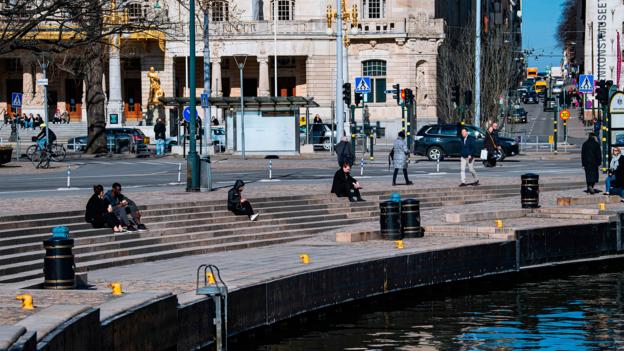
Although keen to stress that coronavirus is still “dealing a really hard blow” to the economy, with bigger levels of layoffs than during the financial crisis, he also points to high levels of cross-industry collaboration that are helping Sweden to face new challenges brought by the crisis.
After thousands of staff from Scandinavian airline SAS were laid off, they were offered additional nursing training so they could support hospitals, thanks to funding from a private research foundation. Workers from truck-maker Scania are supporting a medical company to produce more respirators, and supermarkets have been actively targeting hotel and conference venue staff who’ve lost their jobs.
“It really warms my heart, all this innovation that is going on digitally,” says Ingvarsson, adding that he’s proud of how the Stockholm business community has been able to make so many big decisions together in the absence of physical meetings.
“Sweden is built on a history of collaboration and that shines through in times like this,” agrees Erik Engellau-Nilsson, CEO of Norrsken, a co-working space and investment fund that supports socially-minded entrepreneurs. The foundation recently set up an online platform where start-ups focused on solving problems connected to the coronavirus crisis can apply for funding. Engellau-Nilsson says he’s been “overwhelmed by the response and support from volunteers, initiatives, companies and partners”; initiatives already being profiled by the site include an e-learning company, an app offering free food deliveries for pensioners and a volunteering network.
The future?
What happens next will, of course, depend on how much the virus spreads. The Swedish Public Health Agency has warned that the worst is yet to come for the Nordic nation.
There are long-running concerns about whether hospitals are ready to cope with the potential demand for beds and intensive care equipment, while more recent debates have focused on how well authorities are communicating information. Some experts are calling for more specific instructions about how people should be living their lives. The Swedish Medical Association has expressed concerns that not enough has been done to inform residents who don’t speak Swedish, following a high proportion of deaths and infections in Stockholm’s Somali community, who are more at risk of sharing overcrowded housing.
And while some lone-living Swedes like Cajsa Wiking are confident they can keep their mood up by staying connected to friends and family via Facetime, others are worried about increased levels of loneliness should they end up housebound due to a lockdown.
“This could really affect how Swedes feel,” says Christoffer Carringer, who has recently started living alone for the first time. “Everyone is always screaming for sun and social interaction and attention this time each year after the long winter, so to be denied that, I think could have some sad side effects.” Akinmade Åkerström echoes this sentiment, saying: “For a society that thrives on being outdoors and in nature, that would be the most difficult part for Swedes to mentally deal with if a full lockdown goes into effect.”
Against this background, Sweden’s trust, technology and teamwork may well continue to be valuable assets for the country as things develop, but in times of crisis like this, nothing is certain.
2020-03-28 10:42:17Z
https://www.bbc.com/worklife/article/20200328-how-to-self-isolate-what-we-can-learn-from-sweden
CBMiX2h0dHBzOi8vd3d3LmJiYy5jb20vd29ya2xpZmUvYXJ0aWNsZS8yMDIwMDMyOC1ob3ctdG8tc2VsZi1pc29sYXRlLXdoYXQtd2UtY2FuLWxlYXJuLWZyb20tc3dlZGVu0gEA
Bagikan Berita Ini














DEWAPK^^ agen judi terpercaya, ayo segera bergabungan dengan kami
ReplyDeletedicoba keberuntungan kalian bersama kami dengan memenangkan uang jutaan rupiah
ditunggu apa lagi segera buka link kami ya :) :)